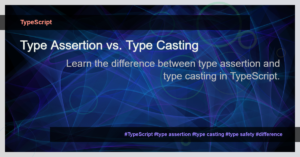Type Assertions in TypeScript: Ensuring Type Safety
TypeScript is a strongly typed superset of JavaScript that provides static type checking at compile time. This feature allows developers to catch errors and ensure code quality before it is executed. One important concept in TypeScript is Type Assertions, which enables developers to explicitly tell the compiler about the type of a value.
What are Type Assertions?
Type Assertions are a way to tell the TypeScript compiler that you know more about the type of a value than it does. It allows for temporary suppression of errors and provides flexibility when working with types.
Type Assertions take the form of value as type or <type>value.
Here is an example:
let someValue: any = 'hello world';
let strLength: number = (someValue as string).length;
In the above example, the someValue is of type any, which can hold any type of value. The type assertion (someValue as string) informs the compiler that we are treating someValue as a string, allowing us to access the length property.
When to Use Type Assertions
Type Assertions are useful in the following scenarios:
- When migrating from JavaScript to TypeScript: To gradually introduce type checking, type assertions can be used to specify the type of existing JavaScript code.
- When working with a union of types: When a variable can have multiple types, type assertions can be used to tell the compiler which specific type to consider.
- When working with third-party libraries: Type assertions can be used to ensure compatibility and access specific properties or methods of a third-party library.
Type Assertion vs. Type Casting
It is important to note that Type Assertions in TypeScript are different from Type Casting in other programming languages.
Type Casting is a runtime concept that involves changing the type of an object during execution. Type Assertions, on the other hand, are only used at compile-time and have no impact on the generated JavaScript code.
Conclusion
TypeScript’s Type Assertions offer developers a way to ensure type safety and provide more control over their code. While they can be helpful in certain scenarios, it is important to use them judiciously and be aware of the potential risks.
In this article, we explored the concept of Type Assertions in TypeScript, how to use them, and when they are beneficial. By utilizing type assertions effectively, you can improve the reliability of your code and catch potential errors at compile time.












